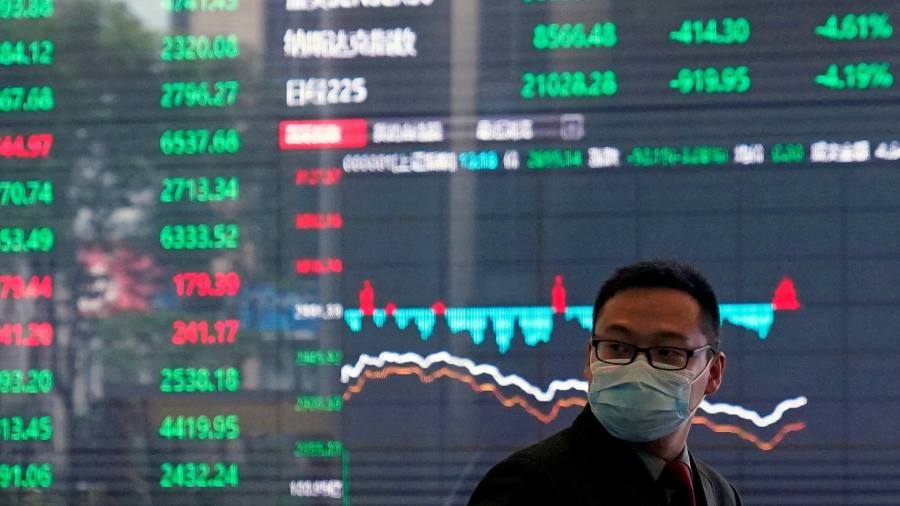
Receive free Chinese business & finance updates
We’ll send you a myFT Daily Digest email rounding up the latest Chinese business & finance news every morning.
China’s securities regulator is struggling to get to grips with a social media phenomenon that is driving share prices as stricter government control over information has forced traders and investors to turn to alternative sources.
Xiaozuowen — meaning “little essay” in Chinese — is typically a small item of unverified news, shared as an image in WeChat messaging groups or other social media apps in order to avoid the text-based censorship those platforms impose.
The phenomenon came to prominence during China’s Covid-19 lockdowns, when a lack of clarity from official media outlets led to online speculation. In November, a four-paragraph screenshot purporting to highlight a shift towards reopening spurred a two-day rally that added $450bn to the value of stocks in the MSCI China Index.
Now, text screenshots claiming imminent policy changes in sectors ranging from property to commodities are garnering increasing attention from investors, as well as from regulators concerned about their veracity and the motives behind them.
“What if they’re true?” said a Shanghai-based trader of mainland Chinese stocks who did not wish to be named. “Other official information and data are even more unreliable and won’t tell you anything new or surprising about China at the moment.”
In one of the first examples of action being taken against the practice, the China Securities Regulatory Commission last month fined Esteel, a small commodities consultancy, Rmb360,000 ($49,700) for publishing information on WeChat that it said was “false” and “without verification”.
China’s securities regulator said two Esteel employees used the social media platform last year to claim that Tangshan, China’s main steelmaking city, would impose production curbs and that the miner Rio Tinto would reduce its production. As a result, the price of iron ore futures climbed 7.6 per cent — a movement representing tens of billions of renminbi.
Tan Yifei, founder of Beijing-based consultancy Jince Frontier, said the posts’ popularity showed the lack of reliable information services in China. “You can’t say it’s a China-only phenomenon, but it’s definitely more extensive when an information market is distorted.”
Six mainland and Hong Kong traders of Chinese stocks and bonds interviewed by the Financial Times said they read every essay post and relied on them for trades, although this was done mainly for fear of “missing out”. All requested anonymity as they were not authorised to speak to the media.
An economist working for an Australian investment bank, who asked to remain anonymous, said the screenshots were not “groundless” because they reflected the markets’ expectations on policies. However, the practice indicated that current policy guidance was not clear enough, he said.
China’s policymaking process has become increasingly opaque in recent years, according to observers, with power more centralised under President Xi Jinping and different departments often unaware of what the other one is doing. This year, geopolitical tensions have also cast a chill over domestic communication.
The essay posts tend to appear every few days and can feature supposed leaks of policy drafts, internal memos and partial transcripts of meetings. Their authors are often anonymous, but commentators, brokerages and even property agents are creating or circulating them.
The property market has proved a popular subject for xiaozuowen speculation, particularly over whether the government will unleash further stimulus for it.
Shares of developer Longfor jumped 8 per cent on the day recently after a text screenshot claimed home purchase restrictions in second-tier cities were about to be cancelled. No immediate announcement followed to back up the claim.
The Shanghai-based trader said he increased his investment in property stocks in mid-June. While they had already been rallying, he was encouraged by screenshots circulating that claimed the policy on buying property was about to be relaxed.
Some quantitative traders have come up with increasingly sophisticated strategies to reflect xiaozuowen in their trading.
“The nature of this phenomenon is what I call ‘secondary game’,” a quantitative trader at a state-owned securities company told the FT. These “unrealised plot twists” arise when “investors [are] left with nothing to trade but have to look for the next change in expectations” he said.
“If I know the [xiaozuowen] headlines would definitely cause a huge negative reaction from the market, I’ll place orders and trim the risk before the market opens,” one Hong Kong-based bond trader added. “If they start circulating at midday . . . I’ll have to act fast to beat it.”
But most traders are now becoming blasé about the practice.
“There are simply too many xiaozuowen,” a bond trader at a Hong Kong entity of a Chinese state-owned asset manager said. “Long-term investors like us can’t keep up with it.”